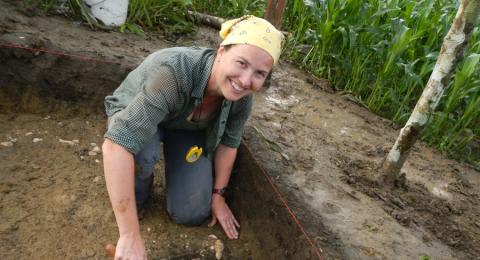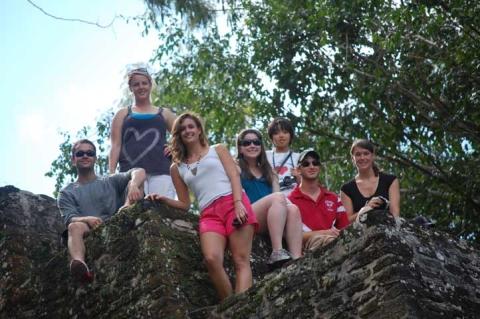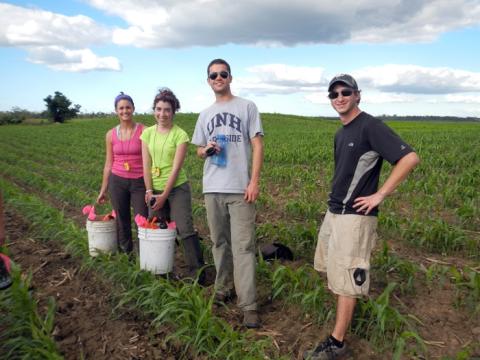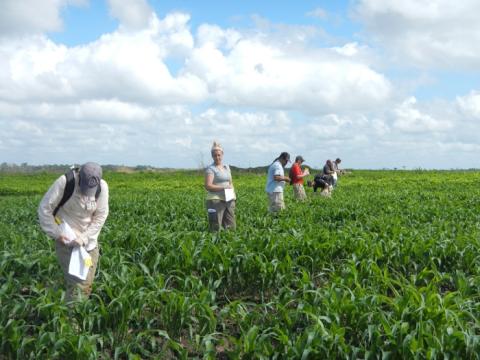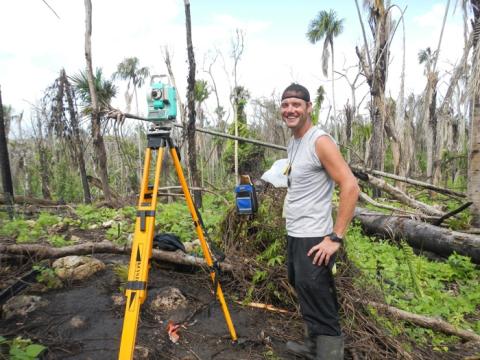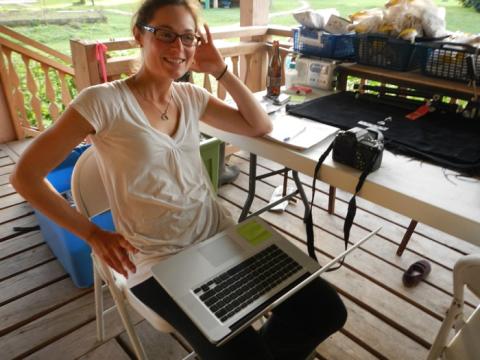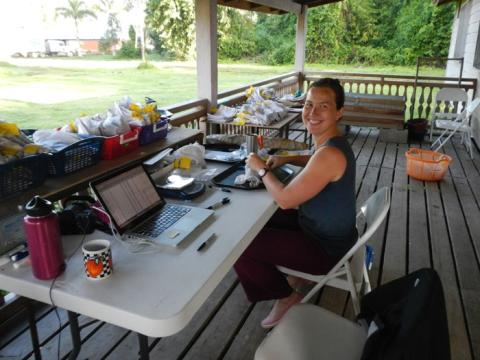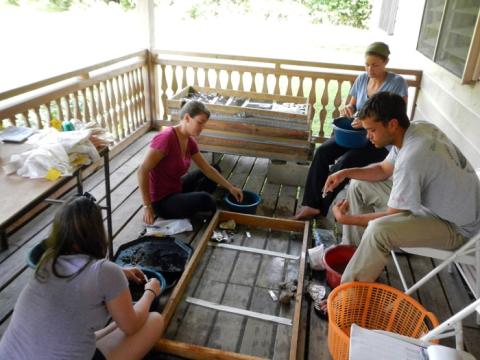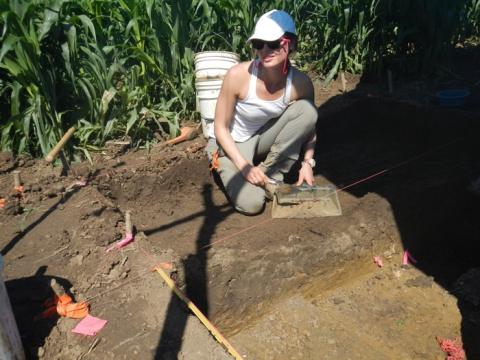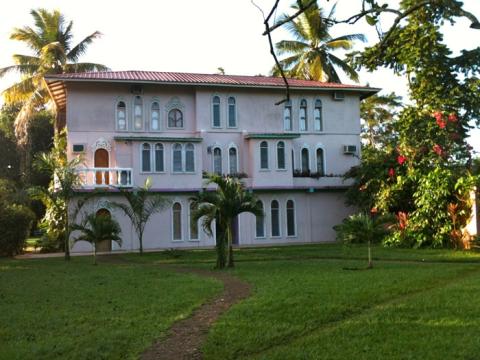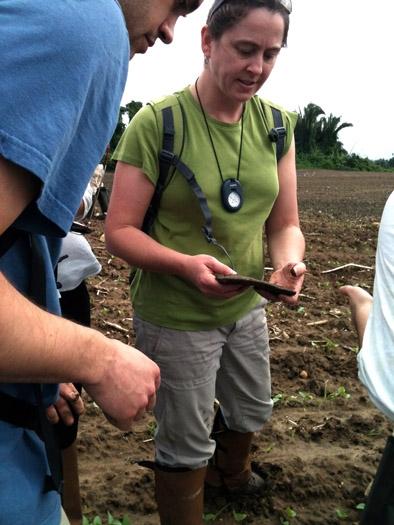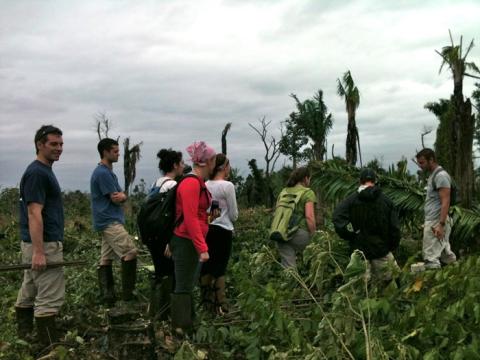Summer Study Abroad Program
Three-week summer Archaeological Field School in Belize.
The archaeological field school in Belize (ANTH 675) offers undergraduate students hands-on training in field and lab techniques. In this intensive three-week program, students will investigate Archaic hunter-gatherer and ancient Maya archaeological sites in the jungles of the lower Belize River Watershed. This is a COLA Center for Study Abroad program offered to UNH and non-UNH students under the direction of UNH Professor Eleanor Harrison-Buck in the Department of Anthropology.
The archaeology field school is based in Belize about 40 minutes north of the international airport. Our base camp will be the Tillett’s Village Lodge, which is located in Crooked Tree village, a small rural Creole community of about 1000 inhabitants. The village is situated on an island within the Crooked Tree Wildlife Sanctuary, which is one of the largest inland wetlands in all of Belize teaming with birds, fish, and other wildlife. Surrounded by seasonal lagoons, the village consists of dirt roads and the island itself is only accessible by a dirt causeway about 15 minutes from the Northern Highway.
Tillett’s Village Lodge will provide lodging and three meals a day to all field school students and staff, including a daily breakfast, pack lunch for field excursions, and a sit-down dinner in their dining room—a thatch and tin-roofed building. During the day, students will experience hands-on field training in the excavation of archaeological sites, as well as artifact processing in the lab back at the camp. Lectures and labs will be held in the evenings. The program also includes several site tours and optional weekend trips.
Apply Now!
Program dates
May 30 - June 20, 2022
Information Session
Wednesday, March 2, 12:40-1:30 PM by Zoom
Application Deadline
Friday, March 18, 2022
Deposit deadline
Friday, April 1, 2022
How to apply Financial Aid/scholarships
Contacts
Eleanor Harrison-Buck
Associate Professor of Anthropology
Belize Archaeological Field School Director
Email: e.harrison-buck@unh.edu
Phone: (603) 862-4742
At the time of application, all students are expected to meet the following criteria:
- At least 12 credits earned at UNH
- Freshmen students not meeting the 12-credit requirement may be allowed to participate in the program. Approval is needed from both the Program Faculty Director. Contact the COLA Center for Study Abroad for guidance.
- A declared major
- A minimum 2.5 cumulative GPA
- Students who do not have a declared major or who have an established GPA between 2.0 and 2.5 may still apply. Admission will be at the discretion of the program faculty director.
- Good standing with the Student Conduct System
- A student who is on probation, regardless of the underlying violation, must successfully petition through the Academic Standards and Advising Committee (ASAC) for permission to participate. Students who have had a past violation will also be required to petition. Please contact your Dean’s Office for more guidance and the petition form, if needed.
It is important for all prospective participants to be fully aware of the conditions of the field school and expectations of the participants. Students are applying to join an archaeological field research project that is operating in Belize, Central America. This is a culturally diverse country and they will be working under conditions that will likely be quite different from those to which they are accustomed. The project requires all participants to live and cooperate in close quarters with others and involves hard physical labor in a hot, tropical environment, often hiking into remote parts of the jungle. Roads are not always going to be paved and in good condition and some riverside sites are only accessible via canoe.
The faculty director Dr. Eleanor Harrison-Buck has been doing archaeology in Belize for over 25 years and initiated the Belize River East Archaeology (BREA) project in 2011. She will be responsible for all aspects of the field school course, including lectures on archaeology, in-field instruction and supervision, and direction of all laboratory work. Permission to survey and excavate sites in the BREA study area has been granted by the Belize Institute of Archaeology.
The Archaeological Field School in Belize is part of Dr. Harrison-Buck's ongoing BREA research project, which she co-directs with Dr. Marieka Brouwer Burg, Assistant Professor in the Anthropology Department at the University of Vermont. The Field School is not a typical study abroad—the program offers college students a rare opportunity to be active participants in the archaeological investigations of ancient Maya sites in the BREA study area. The field school is limited to no more than 12 students. In addition to the Director, the BREA project includes her co-director Dr. Brouwer Burg and four staff members who all have graduate-level training in archaeology. Because we keep the field school small, the program offers an incredible staff to student ratio, with intensive, one-on-one instruction in archaeological field and laboratory methods from staff who all have years of field experience and can share their various areas of expertise in archaeology. Field school activities will range from archaeological excavation to laboratory analyses of artifacts from Archaic hunter-gatherer and ancient Maya archaeological sites in the BREA study area. Project vehicles will transport students to and from the archaeological sites and occasionally sites may be accessed via boat. Students will have the opportunity to learn how to excavate, how to draw profiles and plan maps of their excavations, how to record archaeological data, how to process and analyze artifacts in the lab, and how to document previously unrecorded archaeological sites. Students will receive training in not only fieldwork but also lab methods (artifact cleaning and analysis). Course work will include hands-on field and lab work, a field journal, a written exam based on reading and evening lectures, and a final written report based on original field and lab research. The program also includes several site tours of nearby Maya ruins, including the large sites of Altun Ha and Lamanai, as well as optional trips during a free weekend.
It is important for all prospective participants to be fully aware of the conditions of the field school and expectations of the participants. Students are applying to join an archaeological field research project that is operating in Belize, Central America. This is a culturally diverse country and they will be working under conditions that will likely be quite different from those to which they are accustomed. The project requires all participants to live and cooperate in close quarters with others and involves hard physical labor in a hot, tropical environment, often hiking into remote parts of the jungle and carrying heavy loads. Roads are not always going to be paved and in good condition and some lagoon and riverside sites are only accessible via canoe.
Receiving Credit for the Program
Students attending the University of New Hampshire are required to enroll in ANTH 675, Archaeological Field School in Belize. Students at other universities can easily be admitted to UNH program for the summer and enroll in the course, but must fill out an application. Please Contact the COLA Center for Study Abroad for guidance.
Description of Course Objectives
The archaeological field school in Belize (ANTH 675) offers undergraduate students hands-on training in field and lab techniques. ANTH 675 is an intensive, 4-credit-hour field course designed to introduce students to the methods used to collect and analyze archaeological data. Students will receive instruction in field excavations of archaeological sites and laboratory processing and analyses of recovered artifacts. The course consists of lectures 2-3 nights/week on a variety of topics related to Archaic hunter-gatherer and ancient Maya archaeology, as well as lecture and class discussion on a range of topics concerning archaeological field and laboratory techniques. Evening labs will also include hands-on artifact analyses with one-on-one training from Program staff, all of who are trained professional archaeologists. The goals of the Archaeological Field School are to: a) provide students with an overview of the ancient history of Belize, from Pre-Hispanic to Colonial times (ca. 4000 BC – AD 1900), and b) offer students a thorough understanding and hands-on working knowledge of how archaeological research is conducted in both the field and the lab.
Tuition and Fees
The following charges will be billed to the student's UNH account for the program:
- UNH Summer Tuition for 4 credits
- Estimated program fee*: $2,320.00
- Other mandatory fees: $240.25
*The program fee includes the following:
- All student transportation in Belize once the project begins until it ends
- Excursions to visit several restored archaeological sites (all meals and accommodations)
- Lodging (students will share a cabana with other students)
- Three meals/day 7 days/week while at the lodge
The program fee does NOT include:
- Roundtrip airfare (estimated at $750)
- Other miscellaneous personal expenses.
Payment Info and Refund Policy
A non-refundable deposit of $500 is due two weeks after receipt of an acceptance letter.
View all study abroad payment deadlines, cancellation and refund policy
